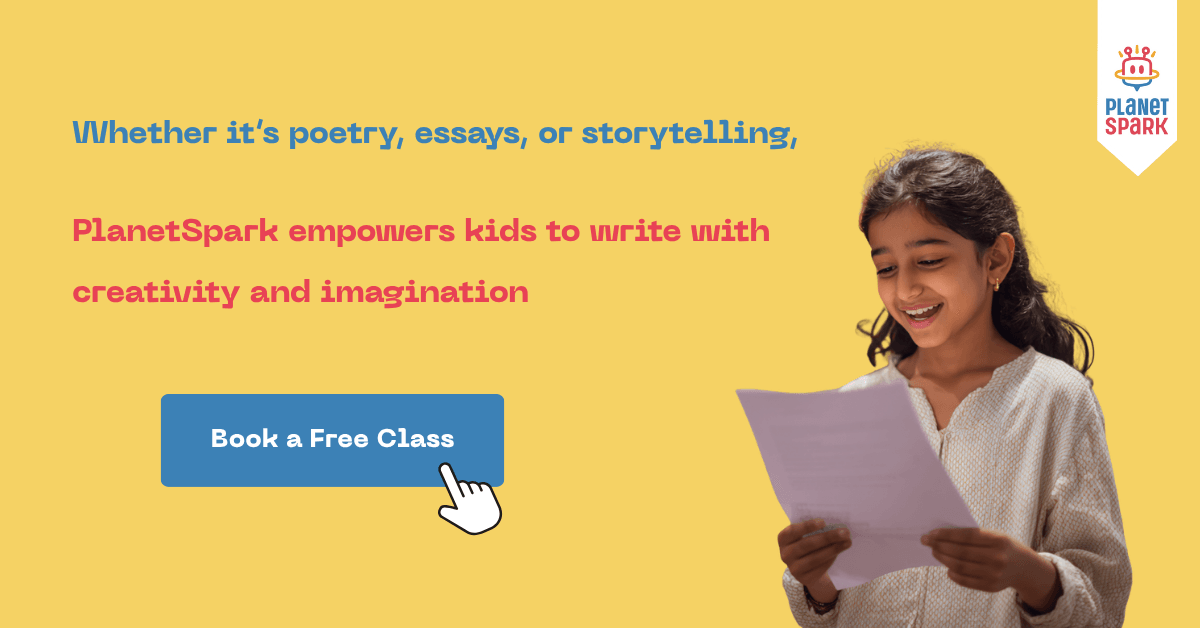Creative Poem Starters Prompts for Kids to Build Writing Skills

Table of Contents
- Memory and Emotion-Based Poem Starters
- People-Themed Poem Starters
- Object and Thing-Based Poem Starters
- Poetry Writing Activities for Kids
- Format-Based Poem Starters
- Performing Poetry to Build Confidence
- Daily Writing Practice at Home
- Why Poetry Is Important for Kids
- How PlanetSpark Helps Your Child Grow
- Conclusion
- FAQs
Does your child love poems but struggle to begin writing one? You’re not alone. Many kids enjoy listening to rhymes and reading poetry, but when it’s time to write, they often ask, “What should I write about?”
That’s where poem starters prompts come in. These simple ideas help children start their poems with ease, improving their creative writing skills, boosting their confidence, and making writing as joyful as reading.
At PlanetSpark, we help children aged 4–14 unlock their creative potential through online creative writing classes, storytelling for kids, and online public speaking classes. With tools like the Spark Diary, AI-led practice sessions, and our 1:1 personal trainers, your child can transform everyday experiences into beautiful poems and stories.
Memory and Emotion-Based Poem Starters
One of the easiest ways for kids to write poetry is by focusing on personal experiences. These prompts encourage them to express emotions and recall moments that matter.
Here are some ideas:
A Favourite Memory: “I still remember the day when…”
Exam or Result Day: “On the day of my exam, my mind…”
A Dream They Had: “Last night, I saw something magical…”
Big Ambitions: “One day, I will become…”
A Special Experience: “When I tried something new…”
Birthday Reflections: “On my birthday, I feel…”
These starters help kids tap into their inner world, which is ideal for storytelling and poetic expression.
"Every great writer starts with a single line. Give your child the tools to begin."
Book a Free Demo Class Today!
People-Themed Poem Starters
Writing about people is another way to make poetry personal and meaningful. Children love to write about the important people in their lives.
Here are some people-focused poem prompts:
Parents: “My parents are like…”
Best Friend: “A true friend is someone who…”
An Enemy or Rival: “I don’t like it when someone…”
Role Models: “I look up to…”
Strangers: “Once I met someone who…”
Grandparents: “Grandparents are like magical books because…”
These poems help children express their feelings about people and relationships, adding depth to their writing.
Object and Thing-Based Poem Starters
Objects might seem simple, but they hold powerful stories. Writing about everyday things teaches kids to observe closely and think creatively.
Try these object-based prompts:
Classroom: “In my classroom, I learn…”
Sun or Moon: “The moon smiles at night because…”
Lunchbox: “My lunchbox hides a surprise…”
School Uniform: “My uniform tells the story of…”
Favourite Toy: “My toy has a secret life…”
A Special Gift: “The gift I love most is…”
Food Item: “A mango is more than just fruit because…”
A Book: “Between the pages, I find…”
An Item They Broke: “Oops! I broke…”
Musical Instrument: “My tabla sings when…”
Water: “Water whispers when…”
Mobile Phone: “If my mobile phone could talk…”
Trophy or Medal: “My medal reminds me of…”
Writing about everyday things helps children develop observation skills and learn to appreciate simple objects in creative ways.

"Poetry helps kids find their voice. Let your child discover the joy of expression."
Join a Free Live Class and See the Difference
Poetry Writing Activities for Kids
In addition to prompts, certain poetry activities make writing a fun and interactive experience. These activities build teamwork, creativity, and vocabulary.
Haiku Jam
How it works: Form a group of three. Each child writes one line of a haiku poem (5-7-5 syllable format).
Why it helps: It teaches concise writing and cooperation.
Alliteration Adventure
How it works: Write a poem where each word starts with the same sound, like “Silly snakes slide silently.”
Why it helps: It improves vocabulary and helps kids understand rhythm in poetry.
Less Than 20 Words Challenge
How it works: Write a meaningful poem using fewer than 20 words.
Why it helps: This activity teaches children to be creative with fewer words and focus on clarity.
These activities encourage children to enjoy poetry without worrying about perfection. They learn to play with words, sounds, and ideas in a relaxed way.
Format-Based Poem Starters
Sometimes, the structure of a poem can be as exciting as the theme. Offering children specific formats gives them new ways to express themselves while learning about different poetry styles. These formats also build the foundation for online creative writing classes and public speaking for kids.
Acrostic Poems
Write a word vertically and use each letter to start a line.
Example:
RAIN
Raindrops fall softly
As the sky turns grey
In puddles, we jump
Night clouds drift away
Rhyming Couplets
This style teaches kids to rhyme and create a rhythm.
Example:
My dog is small but very loud
He chases birds and makes me proud
Free Verse
In free verse, there are no rules. Children can simply let their thoughts flow.
Example:
The sky is purple today
Maybe it is in a playful mood
Haiku
A haiku is a three-line poem with a 5-7-5 syllable structure.
Example:
A butterfly rests
Soft wings shining in the sun
Then it flies away

"Stories, poems, and speeches unlock lifelong skills. Help your child take the first step."
Get a Free Demo of PlanetSpark’s Programs
Performing Poetry to Build Confidence
Writing a poem is just the start. Performing it helps children build communication skills for children, improve memory, and develop public speaking confidence.
Here’s how you can support performance poetry at home:
- Practice reading aloud with expression
- Record recitations to review posture and voice modulation
- Host family open mic nights
- Encourage participation in school recitations or online clubs
These activities prepare children for online public speaking classes and help them become confident communicators.
Daily Writing Practice at Home
Regular practice is the key to mastering poetry and creative writing for kids. Here are simple ways to build a daily habit:
- Set aside 10 minutes daily for writing
- Use a notebook or digital diary to track poems
- Pick a new prompt each day
- Celebrate every completed poem
- Focus on ideas and creativity, not just grammar
A daily writing routine helps children develop their communication skills naturally and consistently.
Why Poetry Is Important for Kids
Poetry teaches valuable life skills. It encourages:
Creative thinking: Kids learn to imagine and describe the world differently
Empathy: Writing about feelings builds emotional understanding
Language development: Poems expand vocabulary and grammar skills
Confidence: Performing poems improves stage presence
Mindfulness: Poetry encourages reflection and careful observation
Poetry writing complements short moral stories for kids, storytelling, and public speaking, making it a holistic learning tool.

How PlanetSpark Helps Your Child Grow
At PlanetSpark, children aged 4 to 14 develop creative writing, storytelling, and public speaking skills through interactive online programs. Our platform turns learning into a fun and personalised experience.
Key Features:
1:1 Personal Trainers: Certified communication experts guide your child in poetry, storytelling, and speaking.
Personalised Learning Roadmap: Each child follows a custom plan, improving grammar, writing, and confidence step by step.
SparkX AI Video Analysis: Kids record performances and receive AI-powered feedback on voice, posture, and fluency.
AI-Led Practice Sessions: Children practise speeches, stories, and poems with a virtual AI coach for extra support.
Spark Diary: A personal digital journal encourages daily writing, helping kids build consistency.
Gamified Learning: Fun activities like Spell Knockout, Antonyms Quiz, and Grammar Guru make language practice exciting.
Learning Clubs and Communities: Join clubs like Poetry Circles, Story Writing Club, and Debate Club to collaborate with peers.
Contests and Showcases: Kids participate in storytelling contests, poetry recitals, and talent showcases to celebrate their progress.
SparkShop eBooks & SparkBee Quizzes: Access daily quizzes and affordable digital books for continuous learning.
Conclusion
Poetry is more than just writing rhymes. It helps children express ideas, emotions, and imagination. With the right poem starter prompts, kids learn to describe the world around them, build their creative writing skills, and gain the confidence to share their thoughts aloud. Whether your child is crafting poems about memories, people, or everyday objects, regular writing practice builds lasting communication abilities.
Encouraging poetry at a young age is one of the best ways to nurture storytelling for kids, develop communication skills for children, and spark a lifelong love for words.
FAQs
What are poem starter prompts?
Poem starter prompts are simple ideas, phrases, or questions that help children begin writing a poem. They remove the fear of a blank page and guide kids to think creatively.
How do poem prompts help improve creative writing for kids?
Poem prompts encourage children to think deeply, choose the right words, and structure their thoughts clearly. They also improve vocabulary, build imagination, and make creative writing for kids fun and engaging.
Can poetry writing help with public speaking for kids?
Yes, writing poetry strengthens the same skills used in public speaking for kids. It teaches children to speak with emotion, use voice modulation, and express ideas confidently in front of others.
How often should my child practise poetry writing?
Daily or weekly writing practice is ideal. Short, regular writing sessions using poem starter prompts help children develop consistent communication skills and build creative thinking over time.
Is poetry suitable for children who are beginners in writing?
Absolutely. Poetry is one of the easiest ways for beginners to start writing. With the help of prompts and fun activities, even young children can learn to write poems and enjoy the process
Personalized Communication Report
Record a video to get a AI generated personalized communication report for your child
